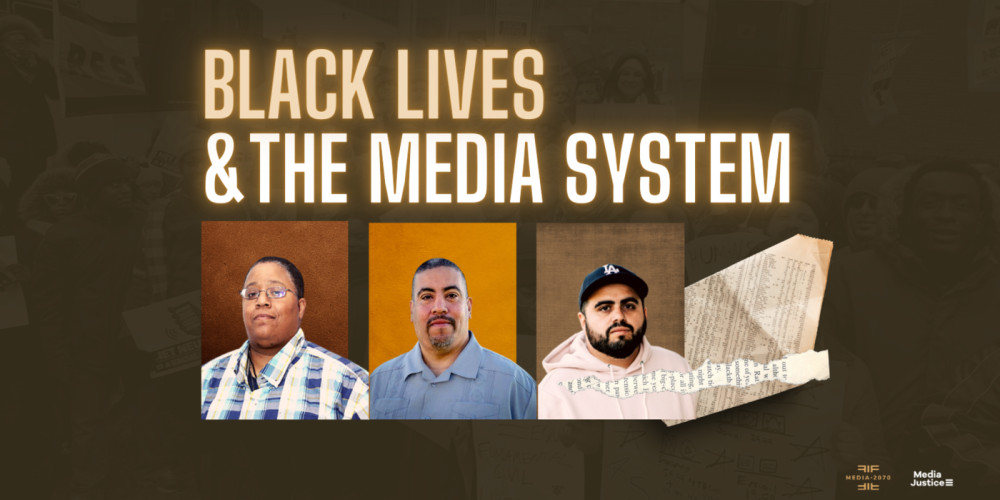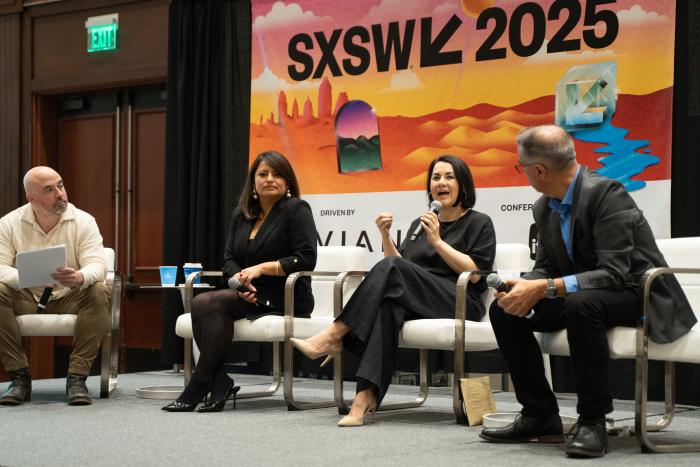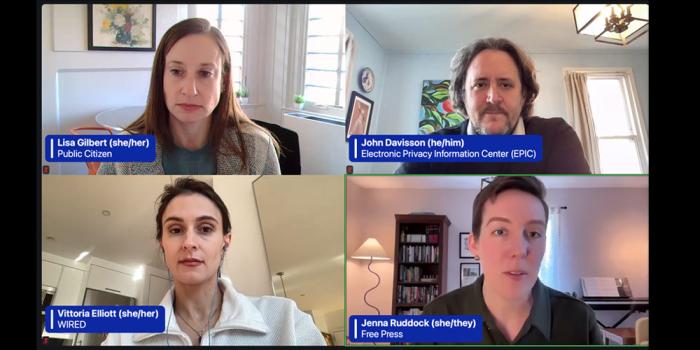How the Media System Fuels Anti-Black Racism

Two longtime advocates recently sat down for a special virtual conversation on “Black Lives and the Media System”.
This hour-long discussion explored how the United States’ dominant media system has propped up racial oppression throughout history and continues to today.
Malkia Devich-Cyril is the co-founder of MediaJustice and part of a group that coined the term “media justice” nearly 20 years ago. Joseph Torres is a journalist, historian and advocate who recently helped launch Media 2070, a living archive and campaign for media reparations.
Against the backdrop of Media 2070’s exploration of the media system’s historical harm of Black lives, Devich-Cyril laid out the stark reality of how that damage has come to a head today:
“This past year has been astonishing. A lot of studies have been done about the overrepresentation of Black people as ‘super-predators’ or ‘super-athletes.’ The result is the same: an explicit belief that we are easier to kill with impunity. That we can take pain better, and we don’t need the same level of health care.
“These are narratives that directly lead to death.
“This isn’t a question of microaggressions, this isn’t about implicit bias, this is about coverage of the issues of the day: the economy, COVID, police violence, elections. All of it explicitly condones the killing of Black people.
“There’s a lot of journalists absolutely struggling to be fair, working within a biased system. But this is not about individuals.
“This is about a narrative system that’s composed of infrastructure, institutions, policies, people and protocols. We’re talking about a narrative system that is quite murderous.
“And as outlets have struggled for resources, investigative journalism has waned and punditry has risen. We’ve seen the emergence since the ’80s of a right-wing echo system, and what it’s echoing is that Black life doesn’t matter.”
Torres laid out a compelling throughline of anti-Black harm, from the earliest U.S. media outlets to today’s multimedia landscape:
“Our media system is the same as any other system in this country: It wasn’t created to help Black folks, it was created to harm Black folks. From the first continuous newspaper to the present day, the media system has worked to uphold a white-racial hierarchy.
“Its goal has always been to create a myth of Black inferiority. Narratives are a political tool that have been weaponized to harm Black and Indigenous folks and other people of color.
“We have a narrative that Black folks are a danger to this country, and that narrative has carried on for centuries because we mainly have white media owners. And now we see it in the algorithms and how online platforms use these narratives to shape conflict in order to synthesize traffic.
“Fortunately throughout the history of [our] country, there have been Black folks who [have fought] these narratives. From the first Black newspaper, Freedom’s Journal in 1827 New York, to Ida B. Wells and today’s Black newspapers.
“When one of the first race commissions was formed to examine what happened in the 1919 Chicago race riot, that report talked about how white-dominated newspapers helped to incite violence that resulted in many more Black folks being harmed.
“And so we go to today, we have all these right-wing networks and we have hate groups organizing online, but also we have so-called progressive media outlets as well, MSNBC or CNN, for example, where they cover race as a spectator sport. They do the same thing as social-media companies: use conflict to get more viewers.
“But you also see a lot of activists use mass media to try to keep their communities informed, and they may not see themselves as journalists but they are performing acts of journalism. And more Black journalists spoke up last year than any other time in recent history, leading major newsrooms to reckon with their histories of racism.”
Connecting the past to the present
When we talk about anti-Black oppression, most people visualize black-and-white photos of enslaved people and civil-rights marches. Dominant media culture gives the sense that these fights took place many centuries ago, in a time completely disconnected and removed from the present age.
When he was asked in 2018 about reparations for slavery, then-Sen. Majority Leader Mitch McConnell voiced a belief that many white people hold when it comes to historical harm of Black communities: “I don’t think reparations for something that happened 150 years ago for whom none of us currently living are responsible is a good idea.”
The reality is that today’s media narratives still broadly display the artifacts of that time, and use those ideas to entrench cultural beliefs that have shaped laws, policies, court decisions and so much more.
Devich-Cyril reflects:
“Growing up in Brooklyn in the 1980s, I remember how Trump was part of amplifying this media misrepresentation of Black youth that led to the conviction of five Black kids [the Central Park Five]. He put out a full-page newspaper ad calling for their deaths, and he could do that — because he was rich, he was white and he was a man.
“I remember the language of that time: ‘Crack baby. AIDS patient. Super-predator. Welfare mom.’ And how all of these portrayals became part of this official story with books like The Bell Curve and others that told the story of our inferiority.
“This is the ’80s and the ’90s. Not the ’50s, the ’30s and the ’20s … not the 1800s. This is just a few years ago, within my lifetime. And it’s happening today.”
Devich-Cyril noted that the corporate media system is not the only media system. Much of Torres’ work as a historian has involved unearthing the work of courageous freedom fighters who have used media and narrative in the fight for Black liberation.
But these fights have had to take place against the backdrop of a highly profitable media machine that enriches white media owners while extracting Black labor and cashing in on the amplification of white supremacy. Black truth tellers have risked their lives to inform our communities and challenge harmful narratives. And their work is central to the larger fight for Black lives.
Devich-Cyril discussed being raised by a mother who was a member of the Black Panther movement, and how their own activism evolved to center on the pursuit of media justice:
“It was because of my mother that I began to understand that the media hasn’t just played a primary role in structuring these narratives, but it has also historically provided the infrastructure for Black enslavement and surveillance.
“In his book [News for All the People], Joe reveals with great clarity how early newspapers were used to catch enslaved Black people. But also, in the 1950s and ’60s, AT&T colluded with the police and the FBI to surveil Black activists.
“AT&T continues to collaborate with the NSA today. AT&T provides direct backbone access to raw data including emails, web-browsing history, social media and other unencrypted online activity. We know the NSA uses the web of AT&T hubs for a surveillance operation codenamed Fairview.
“We know this: It’s been written about in reputable outlets and AT&T has admitted to it.
“So, the question is not whether this media system is racist. My mother taught me that. But she also taught me that democratizing culture is a liberation strategy. It’s a tool to our freedom and a parallel freedom structure.
“To transform the material conditions of our lives, we also have to transform the cultural conditions.”
The conversation rounded out with a discussion of what brings these two longtime activists hope, even amid such challenging times.
Torres mentioned the newsroom reckonings that continue to unfold nationally from The Los Angeles Times to The Kansas City Star, The Philadelphia Inquirer and beyond:
“What makes me hopeful is the reckonings that are happening today. The coronavirus laid bare for journalists to see that many media don’t cover those issues of structural racism. That gives me hope that we can create the change.”
And Devich-Cyril uplifted the hope that is inherent in the Media 2070 vision:
“We need some truth, we need some reconciliation. We also need some reparations. We can reclaim the infrastructure of our culture because that will reclaim the infrastructure of our dignity, of our freedom, and of our lives and I believe that that's what this whole thing is all about.”
Watch the full conversation between Malkia Devich-Cyril and Joseph Torres, moderated by MediaJustice Executive Director Steven Renderos:




